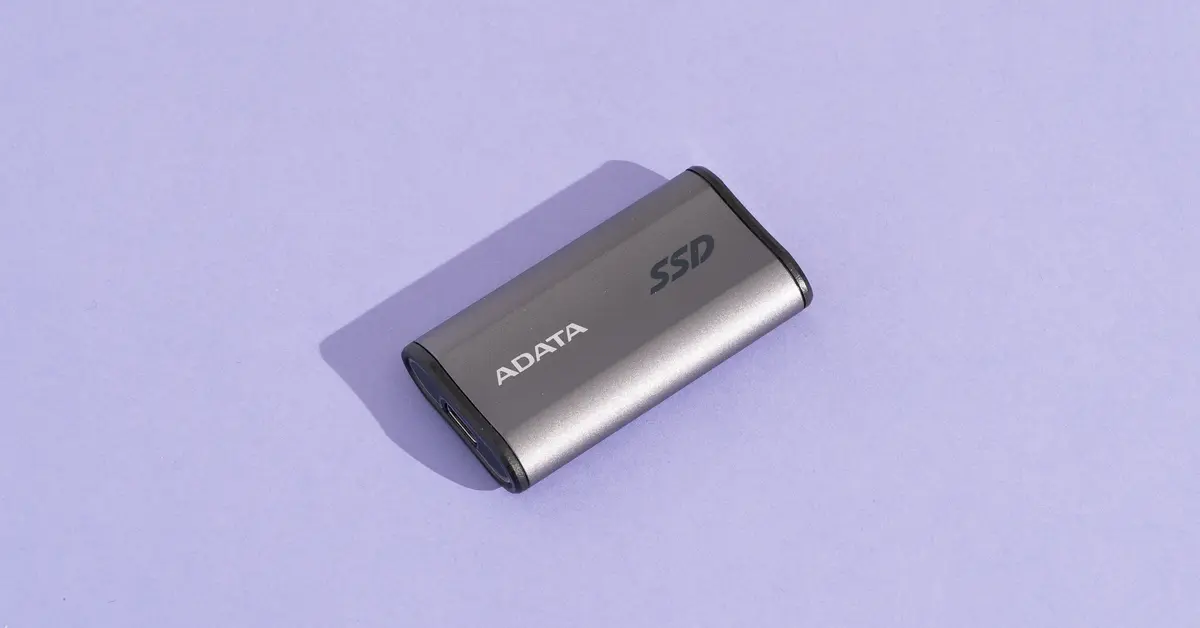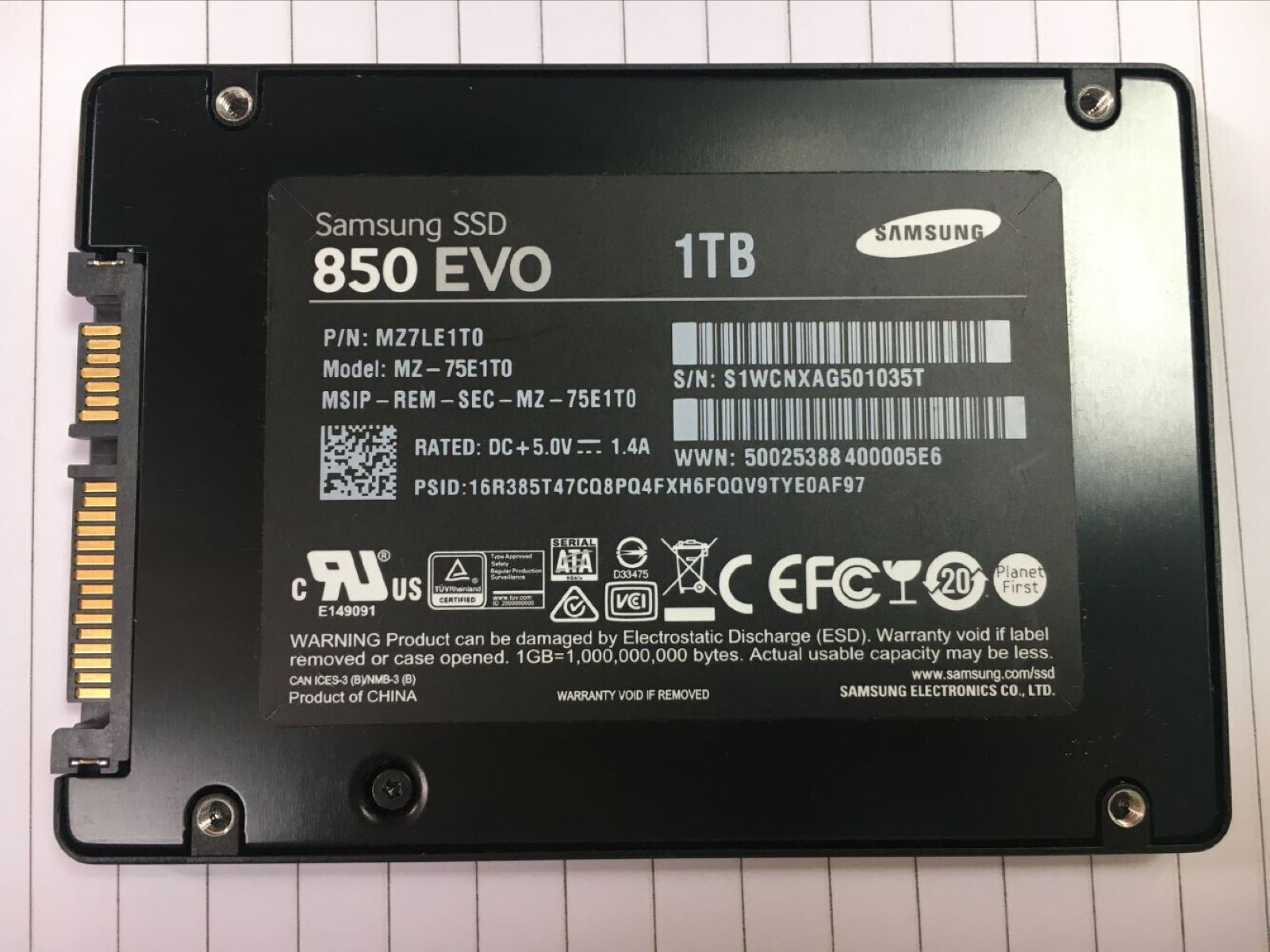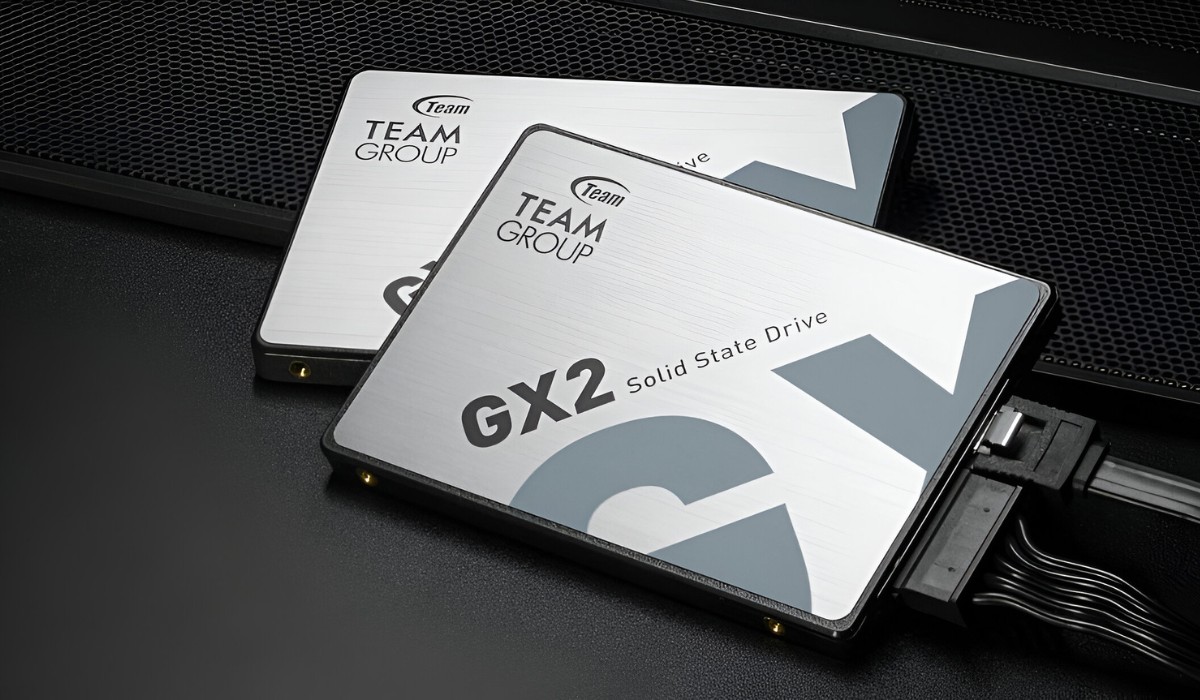Introduction
Welcome to the world of technology where storage plays a significant role in our daily lives. With the increasing amount of digital data we generate, it becomes essential to have reliable and spacious storage solutions. One such solution is the 1TB SSD storage. In this article, we will delve into what 1TB SSD storage means and why it has gained popularity in recent years.
SSD, short for Solid State Drive, is a storage device that uses flash memory technology to store data. Unlike traditional Hard Disk Drives (HDDs), SSDs have no moving parts, which makes them faster, more durable, and energy-efficient. TB, on the other hand, stands for Terabyte, which is a unit of digital information storage capacity. 1TB equates to 1,000 gigabytes or approximately one trillion bytes of data.
Individually, the terms SSD and TB have their own significance. But when combined, they create a powerful storage solution that offers ample space for your digital files, whether it’s documents, photos, videos, or games. 1TB SSD storage allows you to store and access a vast amount of data with lightning-fast speeds, giving you a seamless and efficient user experience.
Over the years, SSDs have gained popularity due to their numerous advantages over HDDs. SSDs provide faster boot-up times, quicker file transfers, and improved overall system performance. With a 1TB SSD, you can load applications and games with lightning speed, multitask seamlessly, and enjoy a smooth computing experience without any lag.
Choosing the right storage solution is crucial, especially when it comes to the large volume of data we handle in our personal and professional lives. Whether you are a student, a photographer, a content creator, or a business professional, having a spacious and dependable storage solution is imperative. In the following sections, we will explore the benefits of 1TB SSD storage and the factors you should consider when choosing the right one for your needs.
What is SSD?
SSD, which stands for Solid State Drive, is a type of storage device that has gained immense popularity in recent years. Unlike traditional Hard Disk Drives (HDDs), which use spinning platters and magnetic read/write heads to store data, SSDs utilize flash memory technology. This means that SSDs have no moving parts, resulting in faster performance and greater reliability.
Flash memory is a non-volatile storage medium that retains data even when the power is turned off. In an SSD, the flash memory chips store data in cells, which are organized into pages and blocks. When you save or retrieve data from an SSD, the information is stored or accessed directly from these cells, eliminating the need for mechanical components found in HDDs.
One of the key advantages of SSDs is their speed. Since SSDs have no moving parts, they can access data almost instantaneously. This results in faster boot-up times, quicker application launches, and reduced file transfer durations. Whether you’re booting up your computer, opening a large file, or running demanding software, an SSD can greatly improve your overall system performance.
Furthermore, the lack of moving parts in an SSD makes it more durable and resistant to shock and vibration compared to traditional HDDs. This makes SSDs ideal for portable devices such as laptops, where accidental drops or bumps are more likely to occur. SSDs also consume less power, contributing to longer battery life on laptops and reducing the overall energy consumption of your system.
As technology continues to advance, SSDs have become more affordable and accessible, making them a popular choice for both personal and professional use. They are available in various form factors, including SATA, M.2, and NVMe, catering to different device types and connectivity options.
In summary, an SSD is a storage device that utilizes flash memory instead of spinning platters found in traditional HDDs. This results in faster performance, improved durability, and reduced power consumption. With its many advantages, SSDs continue to redefine the storage landscape and provide users with a reliable and efficient storage solution.
What is TB?
TB, an abbreviation for Terabyte, is a unit of measurement used to quantify digital storage capacity. It represents a massive amount of data that can be stored on a storage device. One terabyte is equal to 1,000 gigabytes (GB) or approximately one trillion bytes.
With the exponential growth of digital content, the need for large storage capacities has become essential. Whether it’s high-resolution photos, HD videos, or hefty software applications, our digital lives are filled with data that needs a place to be stored. The terabyte provides a convenient way to quantify and comprehend the vastness of storage space available on modern devices.
In practical terms, a terabyte can hold an immense amount of data. For instance, it can store thousands of hours of high-definition videos, hundreds of thousands of photos, or a vast library of music files. It provides a considerable amount of space for storing documents, spreadsheets, and other files for personal or professional use.
Terabytes are commonly used to describe the capacity of various storage devices, including hard drives, solid-state drives (SSDs), and cloud storage solutions. For example, a 1TB HDD can hold a significant amount of data, providing ample space for both personal and professional needs. Cloud storage providers often offer plans with terabytes of space, allowing users to securely store and access their data from anywhere with an internet connection.
It’s important to note that the actual usable storage capacity of a terabyte may be slightly less than the advertised capacity. This discrepancy is due to how storage devices are formatted and the overhead required for file systems and maintenance. Additionally, operating systems and software also consume some storage space.
In summary, a terabyte represents an enormous storage capacity that allows for the storage of vast amounts of data, from photos and videos to documents and applications. With the increasing demand for digital storage, terabytes have become a common unit of measurement to quantify the storage space available on various storage devices and cloud solutions.
What does 1TB mean?
When we talk about storage capacity, the term “1TB” refers to 1 Terabyte, which is equal to 1,000 Gigabytes (GB) or approximately one trillion bytes of data. To put it into perspective, 1TB can hold an enormous amount of digital content.
For example, a 1TB storage capacity allows you to store thousands of high-resolution photos, hundreds of hours of high-definition videos, or a vast collection of music files. It provides ample space for storing documents, spreadsheets, and other files for personal or professional use.
In terms of video content, a 1TB storage capacity can store roughly 250 hours of high-definition footage or almost 4,000 hours of standard-definition videos. This allows you to save your favorite movies, TV shows, and home videos without worrying about running out of space.
When it comes to gaming, a 1TB storage capacity provides enough space to house a considerable number of games. With the increasing storage requirements of modern games, especially those with high-resolution textures and expansive worlds, a 1TB SSD allows you to install and play a substantial library of games without the need for frequent deletions or external storage solutions.
For professionals working with large files, such as designers, videographers, or architects, a 1TB storage capacity is invaluable. It provides enough space to store project files, multimedia assets, and other data-intensive files, ensuring easy access and collaboration.
It’s worth noting that the usable storage capacity of a 1TB storage device may be slightly less than 1TB. This is because a portion of the capacity is reserved for formatting, system files, and other overhead. Additionally, the operating system and installed applications also consume some space.
In recent years, the cost of storage has significantly decreased, making 1TB storage options more affordable and widely available. From external hard drives and solid-state drives (SSDs) to cloud storage solutions, the 1TB capacity provides users with a substantial amount of storage space that can meet the needs of the typical user.
In summary, 1TB represents a sizable storage capacity that allows for the storage of vast amounts of content, such as photos, videos, music, and documents. The 1TB capacity is well-suited for various purposes, from personal media collections and gaming libraries to professional data storage requirements.
Differences between SSD and HDD
When it comes to storage, there are significant differences between Solid State Drives (SSDs) and Hard Disk Drives (HDDs). These differences impact factors such as speed, durability, power consumption, and overall performance. Let’s explore the key distinctions between SSDs and HDDs:
Technology: SSDs use flash memory technology, which stores data in non-volatile memory cells. HDDs, on the other hand, utilize spinning platters coated with a magnetic material, along with read/write heads to access and store data.
Speed: SSDs are significantly faster than HDDs. They have faster read and write speeds, resulting in quicker boot times, faster application launches, and improved overall system responsiveness. HDDs, due to their mechanical nature, have slower read and write speeds.
Durability: SSDs have no moving parts, making them more resistant to shock, vibration, and physical damage. Since there are no spinning disks or read/write heads, SSDs can withstand accidental drops or rough handling better than HDDs. HDDs are more prone to failure if subjected to shocks or impact.
Noise: SSDs are virtually silent since they have no moving parts. HDDs, on the other hand, produce audible noise due to the spinning platters and the movement of the read/write heads.
Power Consumption: SSDs consume less power than HDDs. The absence of moving parts in SSDs results in lower energy requirements, making them more energy-efficient and contributing to longer battery life in laptops or portable devices.
Storage Capacity: HDDs generally offer larger storage capacities compared to SSDs. HDDs are available in terabytes, providing more space for data storage at a lower cost per gigabyte, while SSDs commonly come in smaller capacities, although larger capacity SSDs are becoming more widespread.
Price: SSDs are usually more expensive per unit of storage compared to HDDs. However, as technology advances and SSDs become more prevalent, their prices continue to drop, making them more affordable for consumers.
Reliability: SSDs generally have a lower failure rate than HDDs due to their lack of mechanical parts. This higher reliability results in fewer data losses and a lower likelihood of drive failure.
In summary, SSDs and HDDs differ significantly in terms of technology, speed, durability, power consumption, and price. SSDs offer faster performance, higher durability, lower power consumption, and improved reliability. HDDs, on the other hand, provide larger storage capacity at a more affordable price. The choice between SSD and HDD depends on the specific needs of the user, balancing factors such as speed, capacity, and cost.
Benefits of 1TB SSD Storage
1TB SSD storage offers numerous benefits over traditional storage solutions, making it an excellent choice for individuals and businesses alike. Let’s explore the advantages of having a 1TB SSD:
1. Speed: One of the most significant advantages of 1TB SSD storage is its lightning-fast speed. SSDs have no moving parts, allowing for near-instantaneous data access and transfer. With a 1TB SSD, you can experience faster boot times, quicker application launches, and seamless multitasking.
2. Performance: SSDs provide superior performance compared to traditional hard drives. With a 1TB SSD, you can enjoy smooth and responsive computing, whether you’re editing videos, running resource-intensive software, or gaming with demanding graphics. It greatly enhances overall system performance and reduces lag or delays.
3. Reliability: SSDs are more reliable and durable than traditional hard drives. Since there are no mechanical parts involved, they are less susceptible to damage from drops, shocks, or vibration. This increased reliability reduces the risk of data loss and ensures the safety of your valuable files stored on the drive.
4. Energy Efficiency: 1TB SSDs consume less power compared to traditional hard drives. The absence of moving parts results in lower energy requirements, making SSDs more energy-efficient. This not only helps prolong the battery life of laptops and portable devices but also contributes to reducing energy consumption and environmental impact.
5. Noise-free Operation: SSDs operate silently since there are no mechanical components involved. Unlike traditional hard drives that produce audible noise from spinning disks and read/write heads, a 1TB SSD provides a quiet and noise-free computing experience.
6. Compact Size: SSDs are smaller and lighter than traditional hard drives, allowing for easier installation and portability. The compact form factor of a 1TB SSD makes it ideal for laptops, ultrabooks, and smaller form factor desktop PCs, where space is limited.
7. Ample Storage Space: With 1TB of storage capacity, you have ample space to store a large and diverse collection of files. Whether it’s your extensive media library, work documents, or game installations, a 1TB SSD provides plenty of room to accommodate your storage needs.
8. Future-Proofing: As digital files and software applications continue to grow in size, having sufficient storage space is crucial. With a 1TB SSD, you can future-proof your storage needs, ensuring that you have enough space to store your data as technology and file sizes evolve over time.
In summary, 1TB SSD storage offers a multitude of benefits, including faster speeds, improved performance, enhanced reliability, energy efficiency, noise-free operation, compact size, ample storage space, and future-proofing. These advantages make 1TB SSD storage an excellent choice for individuals and businesses looking for high-performance and reliable storage solutions.
Factors to Consider when Choosing a 1TB SSD
When selecting a 1TB SSD, there are several important factors to consider that will help you make an informed decision. Let’s explore the key factors to keep in mind:
1. Speed and Performance: Look for an SSD with high read and write speeds. This will ensure fast data transfer and quick application loading times, providing a smooth and responsive user experience.
2. Durability and Reliability: Consider the durability and reliability of the SSD. Look for features like shock resistance and data protection technologies to ensure your data remains safe and secure.
3. NAND Flash Type: Different types of NAND flash memory, such as Single-Level Cell (SLC), Multi-Level Cell (MLC), and Triple-Level Cell (TLC), offer varying levels of performance, endurance, and cost. Consider your needs and budget when choosing the type of NAND flash.
4. Endurance and Lifespan: Check the endurance rating of the SSD, which indicates how many write cycles it can handle before potential failure. Higher endurance ratings ensure a longer lifespan for the drive.
5. Form Factor: Consider the form factor that will work best for your system. 1TB SSDs are available in various form factors such as 2.5-inch SATA, M.2, and PCIe. Ensure compatibility with your device and available connectors.
6. Warranty: Look for a manufacturer that offers a solid warranty for the SSD. A longer warranty period indicates the manufacturer’s confidence in the product’s quality and reliability.
7. Price: Compare prices from different manufacturers and consider the SSD’s value for money. While SSDs tend to be more expensive than traditional hard drives, prices have become more affordable over time.
8. Brand Reputation: Consider purchasing an SSD from a reputable and trusted manufacturer. Look for reviews and customer feedback to ensure a reliable product and good customer support.
9. Power Efficiency: If you are concerned about power consumption, look for an SSD with low power requirements. This is particularly important for laptops and other battery-powered devices.
10. Additional Features: Consider any additional features or software provided by the manufacturer. Features such as data migration software, encryption, and performance optimization tools can enhance the overall SSD experience.
In summary, when choosing a 1TB SSD, factors such as speed, durability, NAND flash type, endurance, form factor, warranty, price, brand reputation, power efficiency, and additional features should be considered. Assessing these factors will help you find the best 1TB SSD that suits your needs and provides excellent performance and reliability.
Frequently Asked Questions (FAQs)
Here are some commonly asked questions about 1TB SSD storage:
Q: What does 1TB SSD storage mean?
A: 1TB SSD storage refers to a Solid State Drive with a storage capacity of 1 Terabyte, which is equivalent to 1,000 Gigabytes or approximately one trillion bytes of data. It provides ample space for storing a large amount of digital content such as files, photos, videos, and applications.
Q: What are the advantages of 1TB SSD storage over HDD?
A: 1TB SSD storage offers numerous benefits over traditional Hard Disk Drives (HDDs), including faster speeds, improved performance, higher durability, lower power consumption, noise-free operation, and compact size. SSDs also provide better resistance to physical damage, making them more reliable and secure for storing your valuable data.
Q: Can I upgrade my existing laptop or desktop with a 1TB SSD?
A: In most cases, you can upgrade your existing laptop or desktop with a 1TB SSD as long as your system supports the chosen form factor (e.g., 2.5-inch SATA, M.2, PCIe). Ensure compatibility with your device’s interface and consult the manufacturer’s documentation or customer support for specific upgrade instructions.
Q: How much usable space will I have on a 1TB SSD?
A: The usable storage space on a 1TB SSD will be slightly less than 1TB due to formatting overhead, file systems, and other system files. This is normal and expected. The exact usable space may vary depending on the SSD manufacturer and the specific drive model.
Q: Are there any specific care or maintenance requirements for 1TB SSD storage?
A: 1TB SSD storage generally requires minimal maintenance. However, it is recommended to keep your SSD firmware up to date, avoid extreme heat or cold, and perform regular backups of your important data to ensure its safety. Following the manufacturer’s guidelines for care and maintenance can help prolong the lifespan and optimize the performance of your 1TB SSD.
Q: Can I use a 1TB SSD for gaming?
A: Yes, a 1TB SSD is an excellent choice for gaming. It provides ample space to store a vast library of games and offers faster loading times, reduced game lag, and improved overall gaming performance. With a 1TB SSD, you can enjoy a seamless and immersive gaming experience.
Q: How do I transfer my data from an existing storage device to a 1TB SSD?
A: You can transfer your data from an existing storage device to a 1TB SSD using various methods. These include using data migration software provided by the SSD manufacturer, manually copying files, or using specialized tools for cloning your entire system. It is recommended to back up your data before performing any data transfer process to avoid data loss.
Q: Can I use a 1TB SSD as an external storage device?
A: Yes, you can use a 1TB SSD as an external storage device by connecting it to your computer or other compatible devices using appropriate interfaces such as USB or Thunderbolt. External 1TB SSDs are available in portable and rugged designs, offering flexibility and convenience for storing and accessing your data on the go.
In summary, these frequently asked questions provide helpful information about 1TB SSD storage, including its meaning, advantages, compatibility, care, and usage. Understanding these FAQs will help you make informed decisions about incorporating 1TB SSD storage into your digital lifestyle.
Conclusion
1TB SSD storage offers a compelling storage solution for individuals and businesses alike. With its lightning-fast speed, improved performance, enhanced durability, and lower power consumption, a 1TB SSD provides significant advantages over traditional hard drives.
By combining the benefits of SSD technology with a spacious 1TB storage capacity, users can enjoy faster boot times, quicker application launches, and seamless multitasking. The reliability and durability of SSDs make them an ideal choice for safeguarding valuable data, while their compact size and energy efficiency make them suitable for a variety of devices.
When choosing a 1TB SSD, factors such as speed, durability, NAND flash type, endurance, form factor, warranty, price, brand reputation, power efficiency, and additional features should be carefully considered. Assessing these factors will help ensure that you select the right 1TB SSD that meets your needs and fits your budget.
From personal media storage and gaming libraries to professional data storage requirements, a 1TB SSD offers ample space for storing a diverse range of digital content. The abundance of storage provided by a 1TB SSD allows users to future-proof their storage needs and handle the increasing size of files and applications in the evolving digital landscape.
In conclusion, 1TB SSD storage represents a powerful and versatile storage solution that delivers faster performance, increased reliability, and improved user experience. By choosing a 1TB SSD, users can enhance their computing experience, secure their data, and enjoy the benefits of advanced storage technology in their everyday lives. Embracing the power of 1TB SSD storage opens up a world of possibilities for managing and accessing digital content efficiently and effectively.

























